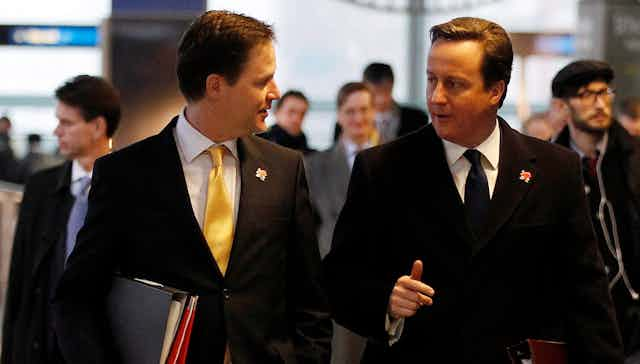Compromise. It’s one of those Jekyll and Hyde verbs. Used actively, it’s a good thing - you want something; I want something different; we talk it over; we come to an arrangement; we compromise.
Used passively, it comes over all negative - someone’s obliged to do or say something they don’t really want to; suddenly they’re not compromising; they’re compromised.
So it is with the UK’s governing coalition. On one hand, we have the Conservatives and the Lib Dems “working together in the national interest”, reconciling or at least splitting their differences in order to hammer out a compromise capable of lifting the country out of the mess left behind by the last Labour government.
On the other, we see both parties accused (often, in the Tories’ case, by their own supporters) of being, or feeling, compromised – forced into either supporting measures that they would normally oppose or failing to do what they’d apparently promised.
The Queen’s Speech was an obvious case in point – and a convenient way of taking the temperature of a coalition that now has more of a past than a future, always presuming, in the light of the red-hot row currently convulsing the Conservative Party, it actually has a future.
Despite their best efforts – and, with excellent bloggers such as Mark Pack and Stephen Tall on their side, those efforts are often pretty impressive – it sometimes seems as if the Lib Dems’ main justification for their joining and continuing the coalition is their ability to derail the most draconian and dry schemes of their Conservative partners. Remarkably, this remains the case even when, in some people’s eyes, Nick Clegg and his colleagues have spent most of the last three years not so much compromising as being compromised.
From the trebling of tuition fees, through austerity, welfare and immigration policies that, to hear some of their erstwhile supporters talk, have made a mockery of the party’s social democratic heritage, it is not difficult for those inclined to do so to paint a picture of a bunch of elitist Orange Bookers - sell-outs who, even when they don’t see entirely eye-to-eye with their Tory friends, have bet the farm on being thanked for their efforts in the end by an electorate grateful to them for preventing us somehow ending up like Greece.
To those left spluttering by what they see as the disingenuousness of it all, Nick Clegg’s post-Queen’s Speech pronouncements on his government’s planned shake up of childcare will only raise their blood pressure higher still.
This was typical, critics will say, of the Lib Dem’s modus operandi on health, welfare and education. This essentially runs as follows: empathise, emote, express your “serious concerns”, ensure they are duly noted by the media, then bend over and brace yourself.
Given all the worrying survey research and local election results, it looks like many voters don’t (and probably won’t) buy it. But judging by the lack of internal criticism of Clegg and co by their grassroots activists, the strategy has proved remarkably effective in preserving party unity. It has also succeeded in keeping the Lib Dems firmly within the coalition – more firmly than many (including me) imagined would be the case by this stage. Sadly, if predictably, this has failed to secure them and their leader the undying affection of their Conservative partners, as anyone who witnessed Tory Eurosceptics baiting Nick Clegg when he stood in for David Cameron at PMQs yesterday can attest.
Perhaps the biggest effect of the Lib Dems holding their nerve, then, has been to help the Conservatives lose theirs. Clearly, that loss of nerve also has a great deal to with the absence of economic and polling recovery and – as the current car crash over Europe and the even tougher line on immigration taken in the Queen’s Speech suggests – with UKIPs stunning performance in the local elections.
The Tory party’s obsession with the EU, and now with the idea that we’d be “better off out”, hasn’t helped. Nor has Cameron’s woefully poor handling of the issue.
However, the Conservatives’ May madness (and they have to hope that that’s all it turns out to be) is also down to a deeper but equally widespread feeling among Tory MPs, activists and columnists that if the Lib Dems aren’t hacking great lumps out of each other, then Cameron – in spite of the fact that in so many ways his government is out-thatchering Thatcher – can’t really be delivering Conservatism blue in tooth and claw.
“It’s a funny old world”, Maggie is supposed to have said on being unceremoniously dumped by her party once she’d reached her electoral sell-by date in November 1990. Some twenty-two-and-a-half years later, and a month after her death aged 87, it remains very much the case when it comes to the coalition.

